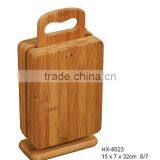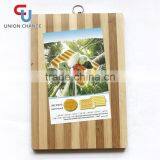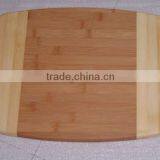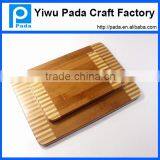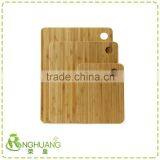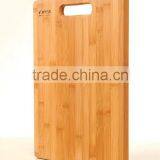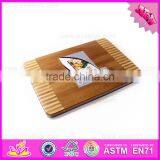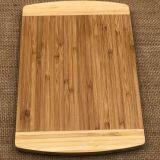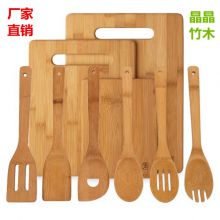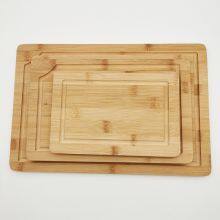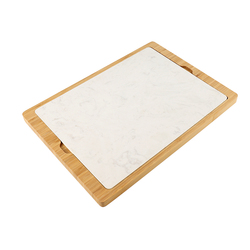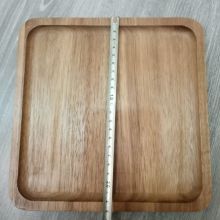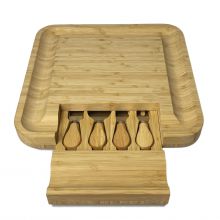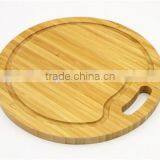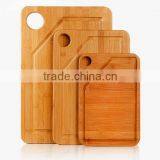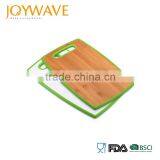You've arrived at the caring guide for choosing the best bamboo chopping board that fits your kitchen. A bamboo cutting board is more than just an accessory; it's an instrument that enhances one’s cooking experience. This guide offers fascinating details on why bamboo chopping boards are favorites among top chefs and home cooks. Learn about the pros, care instructions, and features that set bamboo above other materials used for making chopping boards.
Bamboo is an environmentally friendly choice because it regrows faster than traditional wood cutting boards. Compared to plastic ones, bamboo boards have antimicrobial properties, which reduce the chance of contamination. In addition, bamboo’s beauty and natural elegance enhance the decorative value of any kitchen while still being easy to clean. Since bamboo cutting boards are not as porous as most woods, their absorption of liquids is minimized, and low scrubbing helps keep them clean.
With the bamboo board, the durability factor is well covered. Its natural resistance to knife marks ensures that bamboo cutting boards are not prone to easily splinter or damage. A bamboo board's hardness is compared to oak and maple, which means chop it, slice it, and it can withstand anything. The density of bamboo helps it withstand day-to-day wear and tear, making it a long-lasting companion in kitchens. Keeps its pristine condition for years; with proper maintenance and care, a bamboo cutting board remains warp-free.
The controversy of wood and bamboo cutting board rest on the arguement of practicality aginst sustainability. The bamboo cutting board is much easier to use than wooden ones made from butcher block or acacia wood due to its lightweight nature. Royal Craft Wood created wooden cutting boards that possess a timeless beauty, but bamboo cutting boards add a touch of modernity to this style with their ease of functionality. One of the most amazing things about bamboo cutting boards is the breath of fresh air they bring when preparing vegetables or designing a charcuterie board, because they are made from natural materials.
Using the correct mineral oil will help preserve the cutting board. Using scentless, colorless, food safe treatments helps seal moisture within the board, preventing splits and gouges from forming. Regular care of the wooden surface ensures it retains its appealing shape. An oiled bamboo cutting board looks more attractive and withstands heavy use without damage.
The cutting board’s condition is also usually self-evident. Applying treatment every four weeks is sufficient, unless the user uses it constantly. Adding more care depending on how aged the board is also shoud be taken into account. Applying chipped or rough oil will show signs of wear and tear, necessitating more treatments. Extensions of aesthetically appealing help maintain its polish and focus within understanding kitchens.
A cutting board made from bamboo should be hygienically scrubbed clean after every single use. Bamboo is easier to clean than most other porous materials, but in most cases, specialized cleaners can help with cleaning up. For regular maintenance, bamboo boards are best cleaned using warm water and mild soap. If higher levels of disinfection are needed, a diluted vinegar solution can be used to disinfect surfaces naturally, without harsh chemicals. Make sure the board is dried thoroughly to protect it from water damage. By following these steps, you will ensure that the bamboo board is maintained in top form and can be used for any culinary task at hand.
Getting a Totally Bamboo cutting board set will transform your kitchen experience with innovation and design. The company's strongly claimed to have pioneered the concept of multifunctional bamboo boards which serve the purpose and look great. Their boards come with features like juice grooves and color coding for improved utility and efficiency at work. With such craftsmanship, the company stands as a leader in ecologically responsible choices.
Totally Bamboo ranks quite high when compared to other brands. Many brands focus on aesthetics or utility. Here is an example that tries to blend both and does not compromise. The boards do not warp, and are scuff-resistant, mark-free after use. Along with that, the boards come in various sizes from bar-sized to large serving boards. This attention with a wide selection combined with customer service is what marks the company as a true leader in cutting boards.
Reviews indicate that consumers are happy with products from the company, citing its durability, ease of cleaning, and their innovative designs. These users discuss how the boards strike a balance between functionality and environmental responsibility. The praise for these boards highlights the clever juice groove design and versatility for other cooking activities. Trusting some of the users' reviews can provide clarity and assurance that will help guide you towards a purchase decision you'll enjoy and benefit from continuously.
When comparing bamboo and wooden cutting boards, clear differences stand out. The fact that bamboo is a renewable resource as well as faster growing is in direct contrast with the slower-growing trees used for wooden cutting boards. In terms of bamboo and wood performance, the former's dense fibers make it more resistant to absorption and scratches. Softer wooden surfaces are much more susceptible to knife marks than bamboo. Wooden boards are thicker than their counterparts, which adds to their vintage charm, kindness and yearning for nostalgic times. Ultimately, the difference between the two is simply a matter of preference.
Because it matures so quickly, bamboo is considered extremely sustainable. Unlike wood, which takes decades to grow, bamboo can be harvested within 3 to 5 years. This quick replenishing cycle enhances sustainability and reduces its impact on the environment. For sustainability-focused consumers, bamboo cutting boards are an easy choice.
Both bamboo and wood cutting boards serve great as platters for charcuterie displays as they provide a sturdy surface for arranging meat along with other accompaniments. Undoubtedly, bamboo boards add a modern touch with their smooth natural finish which is perfect for contemporary presentations. On the other hand, wooden boards have a rustic charm that embraces traditional beauty. Regardless of the selection you make, both types enhance the functionality and style of your entertaining as serving pieces.
While selecting a bamboo cutting board, what comes to mind is the size of the board, the thickness, and any extra features such as juice grooves. These factors affect the convenience of the board. Make sure the boards are treated with food-safe oils, smooth to reduce cuts, and easy to clean. Also, ensure the surface of the knives and board is preserved. Finding the best bamboo cutting board is a balance between personal aesthetic preferences and functionality, whether the board is meant for special occasions or everyday chopping.
Some attributes that add value to bamboo cutting boards are non-slip edges, double sided usage, and handles for easier lifting. Minimizing cross-contamination, including color-coded sections, aligns with innovative designs and further strengthens the value of a cutting board. The addition of cutting board mats can increase versatility when it comes to easing various chopping tasks and preventing scratches on the board. Not only do these features improve usability, but they also increase the value of the purchase by strengthening the durability of the cutting board.
They can be bought at any online store and from specially designed kitchenware shops. Online shopping on sites like Amazon allows customers to shop from a wide variety of brands and styles, often displaying reviews from previous customers. One can also get the perks of in-person evaluation at local kitchen specialty stores, in addition to pieces of expert advice from professionals. No matter where you choose to shop, make sure that the online retailer is trustworthy and has good quality assurance for their products.
A: Bamboo cutting boards are popular because they are made from natural materials, making them an eco-friendly choice. Bamboo is naturally antibacterial and more knife-friendly than harder surfaces, helping to keep your knives sharp longer.
A: Bamboo cutting boards for kitchen use are often preferred over plastic boards because they are not only environmentally friendly but also aesthetically pleasing. While plastic boards can be more flexible, bamboo boards offer better durability and are less likely to harbor bacteria.
A: Yes, bamboo cutting boards can effectively be used as chopping boards. Their durability and hardness provide a stable surface for chopping a variety of foods.
A: A natural bamboo cutting board is excellent for slicing bread due to its hard surface and durability, which provides a stable base for even slices.
A: Yes, bamboo cutting boards require some special care. It’s recommended to hand wash them with mild soap and warm water, and occasionally oil them to maintain their condition and prevent them from drying out.
A: With proper maintenance, a bamboo cutting board can last several years. Regular oiling and proper cleaning will help extend its lifespan significantly.
A: Bamboo cutting boards are generally food safe, as bamboo is naturally antibacterial. It's important to clean them properly to ensure they remain hygienic.
